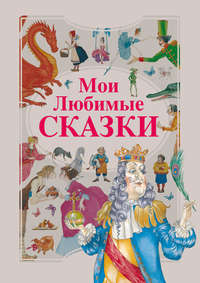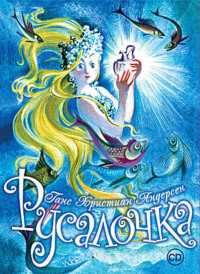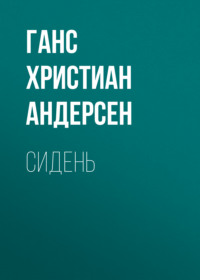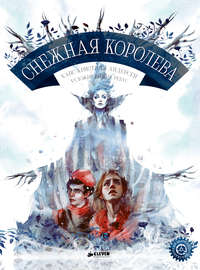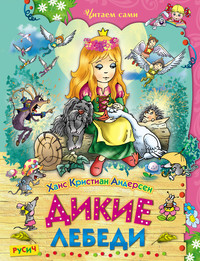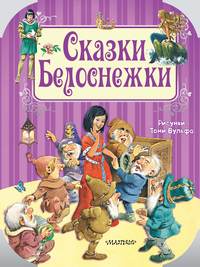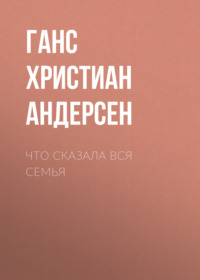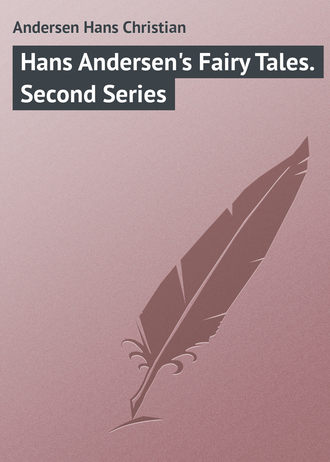 полная версия
полная версияHans Andersen's Fairy Tales. Second Series
It was a great thought, but a great thistle may well have great thoughts.
"Sometimes one is of noble race even if one does not know it," said the nettle growing close by – it had a kind of presentiment that it might be turned into muslin, if properly treated.
The summer passed, and the autumn passed; the leaves fell from the trees; the flowers came with stronger colors and less perfume; the gardener's lad sang on the other side of the fence:
"Up the hill and down the hill,That's the way of the world still."The young pine trees in the wood began to feel a longing for Christmas, though Christmas was still a long way off.
"Here I am still," said the thistle. "It seems that I am quite forgotten, and yet it was I who made the match. They were engaged, and now they are married – the wedding was a week ago. I do not make a single step forward, for I cannot."
Some weeks passed. The thistle had its last, solitary flower, which was large and full and growing down near the root. The wind blew coldly over it, the color faded, and all its glory disappeared, leaving only the cup of the flower, now grown to be as large as the flower of an artichoke and glistening like a silvered sunflower.
The young couple, who were now man and wife, came along the garden path, and as they passed near the fence, the bride, glancing over it, said, "Why, there stands the large thistle! it has no flowers now."
"Yes, there is still the ghost of the last one," said her husband, pointing to the silvery remains of the last flower – a flower in itself.
"How beautiful it is!" she said. "We must have one carved in the frame of our picture."
And once more the young man had to get over the fence, to break off the silvery cup of the thistle flower. It pricked his fingers for his pains, because he had called it a ghost. And then it was brought into the garden, and to the Hall, and into the drawing room. There stood a large picture – the portraits of the two, and in the bridegroom's buttonhole was painted a thistle. They talked of it and of the flower cup they had brought in with them – the last silver-shimmering thistle flower, that was to be reproduced in the carving of the frame.
The air took all their words and scattered them about, far and wide.
"What strange things happen to one!" said the thistle bush. "My first-born went to live in a buttonhole, my last-born in a frame! I wonder what is to become of me."
The old donkey, standing by the roadside, cast loving glances at the thistle and said, "Come to me, my sweetheart, for I cannot go to you; my tether is too short!"
But the thistle bush made no answer. It grew more and more thoughtful, and it thought as far ahead as Christmas, till its budding thoughts opened into flower.
"When one's children are safely housed, a mother is quite content to stay beyond the fence."
"That is true," said the sunshine; "and you will be well placed, never fear."
"In a flowerpot or in a frame?" asked the thistle.
"In a story," answered the sunshine. And here is the story!
THE PEN AND THE INKSTAND
IN A POET'S room, where his inkstand stood on the table, the remark was once made: "It is wonderful what can be brought out of an inkstand. What will come next? It is indeed wonderful."
"Yes, certainly," said the inkstand to the pen and to the other articles that stood on the table; "that's what I always say. It is wonderful and extraordinary what a number of things come out of me. It's quite incredible, and I really never know what is coming next when that man dips his pen into me. One drop out of me is enough for half a page of paper – and what cannot half a page contain?
"From me all the works of the poet are produced – all those imaginary characters whom people fancy they have known or met, and all the deep feeling, the humor, and the vivid pictures of nature. I myself don't understand how it is, for I am not acquainted with nature, but it is certainly in me. From me have gone forth to the world those wonderful descriptions of charming maidens, and of brave knights on prancing steeds; of the halt and the blind – and I know not what more, for I assure you I never think of these things."
"There you are right," said the pen, "for you don't think at all. If you did, you would see that you can only provide the means. You give the fluid, that I may place upon the paper what dwells in me and what I wish to bring to light. It is the pen that writes. No man doubts that; and indeed most people understand as much about poetry as an old inkstand."
"You have had very little experience," replied the inkstand. "You have hardly been in service a week and are already half worn out. Do you imagine you are a poet? You are only a servant, and before you came I had many like you, some of the goose family and others of English manufacture. I know a quill pen as well as I know a steel one. I have had both sorts in my service, and I shall have many more as long as he comes – the man who performs the mechanical part – and writes down what he obtains from me. I should like to know what will be the next thing he gets out of me."
"Inkpot!" retorted the pen, contemptuously.
Late in the evening the poet returned home from a concert, where he had been quite enchanted by the admirable performance of a famous violin player.
The player had produced from his instrument a richness of tone that sometimes sounded like tinkling water drops or rolling pearls, sometimes like the birds twittering in chorus, and then again, rising and swelling like the wind through the fir trees. The poet felt as if his own heart were weeping, but in tones of melody, like the sound of a woman's voice. These sounds seemed to come not only from the strings but from every part of the instrument. It was a wonderful performance and a difficult piece, and yet the bow seemed to glide across the strings so easily that one would think any one could do it. The violin and the bow seemed independent of their master who guided them. It was as if soul and spirit had been breathed into the instrument. And the audience forgot the performer in the beautiful sounds he produced.
Not so the poet; he remembered him and wrote down his thoughts on the subject: "How foolish it would be for the violin and the bow to boast of their performance, and yet we men often commit that folly. The poet, the artist, the man of science in his laboratory, the general – we all do it, and yet we are only the instruments which the Almighty uses. To Him alone the honor is due. We have nothing in ourselves of which we should be proud." Yes, this is what the poet wrote. He wrote it in the form of a parable and called it "The Master and the Instruments."
"That is what you get, madam," said the pen to the inkstand when the two were alone again. "Did you hear him read aloud what I had written down?"
"Yes, what I gave you to write," retorted the inkstand. "That was a cut at you, because of your conceit. To think that you could not understand that you were being quizzed! I gave you a cut from within me. Surely I must know my own satire."
"Ink pitcher!" cried the pen.
"Writing stick!" retorted the inkstand. And each of them felt satisfied that he had given a good answer. It is pleasing to be convinced that you have settled a matter by your reply; it is something to make you sleep well. And they both slept well over it.
But the poet did not sleep. Thoughts rose within him, like the tones of the violin, falling like pearls or rushing like the strong wind through the forest. He understood his own heart in these thoughts; they were as a ray from the mind of the Great Master of all minds.
"To Him be all the honor."
THE TEAPOT
THERE was once a proud teapot; it was proud of being porcelain, proud of its long spout, proud of its broad handle. It had something before and behind, – the spout before and the handle behind, – and that was what it talked about. But it did not talk of its lid, which was cracked and riveted; these were defects, and one does not talk of one's defects, for there are plenty of others to do that. The cups, the cream pot, and the sugar bowl, the whole tea service, would think much oftener of the lid's imperfections – and talk about them – than of the sound handle and the remarkable spout. The teapot knew it.
"I know you," it said within itself. "I know, too, my imperfection, and I am well aware that in that very thing is seen my humility, my modesty. Imperfections we all have, but we also have compensations. The cups have a handle, the sugar bowl a lid; I have both, and one thing besides, in front, which they can never have. I have a spout, and that makes me the queen of the tea table. I spread abroad a blessing on thirsting mankind, for in me the Chinese leaves are brewed in the boiling, tasteless water."
All this said the teapot in its fresh young life. It stood on the table that was spread for tea; it was lifted by a very delicate hand, but the delicate hand was awkward. The teapot fell, the spout snapped off, and the handle snapped off. The lid was no worse to speak of; the worst had been spoken of that.
The teapot lay in a swoon on the floor, while the boiling water ran out of it. It was a horrid shame, but the worst was that everybody jeered at it; they jeered at the teapot and not at the awkward hand.
"I never shall forget that experience," said the teapot, when it afterward talked of its life. "I was called an invalid, and placed in a corner, and the next day was given to a woman who begged for victuals. I fell into poverty, and stood dumb both outside and in. But then, just as I was, began my better life. One can be one thing and still become quite another.
"Earth was placed in me. For a teapot, this is the same as being buried, but in the earth was placed a flower bulb. Who placed it there, who gave it, I know not; but given it was, and it became a compensation for the Chinese leaves and the boiling water, a compensation for the broken handle and spout.
"And the bulb lay in the earth, the bulb lay in me; it became my heart, my living heart, such as I had never before possessed. There was life in me, power and might. The heart pulsed, and the bulb put forth sprouts; it was the springing up of thoughts and feelings which burst forth into flower.
"I saw it, I bore it, I forgot myself in its delight. Blessed is it to forget oneself in another. The flower gave me no thanks; it did not think of me. It was admired and praised, and I was glad at that. How happy it must have been! One day I heard some one say that the flower deserved a better pot. I was thumped hard on my back, which was a great affliction, and the flower was put into a better pot. I was thrown out into the yard, where I lie as an old potsherd. But I have the memory, and that I can never lose."
SOUP FROM A SAUSAGE SKEWER
"WE HAD such an excellent dinner yesterday," said an old lady-mouse to another who had not been present at the feast. "I sat number twenty-one below the mouse-king, which was not a bad place. Shall I tell you what we had? Everything was excellent – moldy bread, tallow candle, and sausage.
"Then, when we had finished that course, the same came on all over again; it was as good as two feasts. We were very sociable, and there was as much joking and fun as if we had been all of one family circle. Nothing was left but the sausage skewers, and this formed a subject of conversation till at last some one used the expression, 'Soup from sausage sticks'; or, as the people in the neighboring country call it, 'Soup from a sausage skewer.'
"Every one had heard the expression, but no one had ever tasted the soup, much less prepared it. A capital toast was drunk to the inventor of the soup, and some one said he ought to be made a relieving officer to the poor. Was not that witty?
"Then the old mouse-king rose and promised that the young lady-mouse who should learn how best to prepare this much-admired and savory soup should be his queen, and a year and a day should be allowed for the purpose."
"That was not at all a bad proposal," said the other mouse; "but how is the soup made?"
"Ah, that is more than I can tell you. All the young lady-mice were asking the same question. They wish very much to be the queen, but they do not want to take the trouble to go out into the world to learn how to make soup, which it is absolutely necessary to do first.
"It is not every one who would care to leave her family or her happy corner by the fireside at home, even to be made queen. It is not always easy in foreign lands to find bacon and cheese rind every day, and, after all, it is not pleasant to endure hunger and perhaps be eaten alive by the cat."
Probably some such thoughts as these discouraged the majority from going out into the world to collect the required information. Only four mice gave notice that they were ready to set out on the journey.
They were young and sprightly, but poor. Each of them wished to visit one of the four divisions of the world, to see which of them would be most favored by fortune. Each took a sausage skewer as a traveler's staff and to remind her of the object of her journey.
They left home early in May, and none of them returned till the first of May in the following year, and then only three of them. Nothing was seen or heard of the fourth, although the day of decision was close at hand. "Ah, yes, there is always some trouble mingled with the greatest pleasure," said the mouse-king. But he gave orders that all the mice within a circle of many miles should be invited at once.
They were to assemble in the kitchen, and the three travelers were to stand in a row before them, and a sausage skewer covered with crape was to stand in the place of the missing mouse. No one dared express an opinion until the king spoke and desired one of them to proceed with her story. And now we shall hear what she said.
WHAT THE FIRST LITTLE MOUSE SAW AND HEARD ON HER TRAVELS"When I first went out into the world," said the little mouse, "I fancied, as so many of my age do, that I already knew everything – but it was not so. It takes years to acquire great knowledge.
"I went at once to sea, in a ship bound for the north. I had been told that the ship's cook must know how to prepare every dish at sea, and it is easy enough to do that with plenty of sides of bacon, and large tubs of salt meat and musty flour. There I found plenty of delicate food but no opportunity to learn how to make soup from a sausage skewer.
"We sailed on for many days and nights; the ship rocked fearfully, and we did not escape without a wetting. As soon as we arrived at the port to which the ship was bound, I left it and went on shore at a place far towards the north. It is a wonderful thing to leave your own little corner at home, to hide yourself in a ship where there are sure to be some nice snug corners for shelter, then suddenly to find yourself thousands of miles away in a foreign land.
"I saw large, pathless forests of pine and birch trees, which smelt so strong that I sneezed and thought of sausage. There were great lakes also, which looked as black as ink at a distance but were quite clear when I came close to them. Large swans were floating upon them, and I thought at first they were only foam, they lay so still; but when I saw them walk and fly, I knew directly what they were. They belonged to the goose species. One could see that by their walk, for no one can successfully disguise his family descent.
"I kept with my own kind and associated with the forest and field mice, who, however, knew very little – especially about what I wanted to know and what had actually made me travel abroad.
"The idea that soup could be made from a sausage skewer was so startling to them that it was repeated from one to another through the whole forest. They declared that the problem would never be solved – that the thing was an impossibility. How little I thought that in this place, on the very first night, I should be initiated into the manner of its preparation!
"It was the height of summer, which the mice told me was the reason that the forest smelt so strong, and that the herbs were so fragrant, and that the lakes with the white, swimming swans were so dark and yet so clear.
"On the margin of the wood, near several houses, a pole as large as the mainmast of a ship had been erected, and from the summit hung wreaths of flowers and fluttering ribbons. It was the Maypole. Lads and lasses danced round it and tried to outdo the violins of the musicians with their singing. They were as gay as ever at sunset and in the moonlight, but I took no part in the merrymaking. What has a little mouse to do with a Maypole dance? I sat in the soft moss and held my sausage skewer tight. The moon shone particularly bright on one spot where stood a tree covered with very fine moss. I may almost venture to say that it was as fine and soft as the fur of the mouse-king, but it was green, which is a color very agreeable to the eye.
"All at once I saw the most charming little people marching towards me. They did not reach higher than my knee, although they looked like human beings but were better proportioned. They called themselves elves, and wore clothes that were very delicate and fine, for they were made of the leaves of flowers, trimmed with the wings of flies and gnats. The effect was by no means bad.
"They seemed to be seeking something – I knew not what, till at last one of them espied me. They came towards me, and the foremost pointed to my sausage skewer, saying: 'There, that is just what we want. See, it is pointed at the top; is it not capital?' The longer he looked at my pilgrim's staff the more delighted he became.
"'I will lend it to you,' said I, 'but not to keep.'
"'Oh, no, we won't keep it!' they all cried. Then they seized the skewer, which I gave up to them, and dancing with it to the tree covered with delicate moss, set it up in the middle of the green. They wanted a Maypole, and the one they now had seemed made especially for them. This they decorated so beautifully that it was quite dazzling to look at. Little spiders spun golden threads around it, and it was hung with fluttering veils and flags, as delicately white as snow glittering in the moonlight. Then they took colors from the butterfly's wing, sprinkling them over the white drapery until it gleamed as if covered with flowers and diamonds, and I could no longer recognize my sausage skewer. Such a Maypole as this has never been seen in all the world.
"Then came a great company of real elves. Nothing could be finer than their clothes. They invited me to be present at the feast, but I was to keep at a certain distance because I was too large for them. Then began music that sounded like a thousand glass bells, and was so full and strong that I thought it must be the song of the swans. I fancied also that I heard the voices of the cuckoo and the blackbird, and it seemed at last as if the whole forest sent forth glorious melodies – the voices of children, the tinkling of bells, and the songs of the birds. And all this wonderful melody came from the elfin Maypole. My sausage peg was a complete peal of bells. I could scarcely believe that so much could have been produced from it, till I remembered into what hands it had fallen. I was so much affected that I wept tears such as a little mouse can weep, but they were tears of joy.
"The night was far too short for me; there are no long nights there in summer, as we often have in this part of the world. When the morning dawned and the gentle breeze rippled the glassy mirror of the forest lake, all the delicate veils and flags fluttered away into thin air. The waving garlands of the spider's web, the hanging bridges and galleries, or whatever else they may be called, vanished away as if they had never been. Six elves brought me back my sausage skewer and at the same time asked me to make any request, which they would grant if it lay in their power. So I begged them, if they could, to tell me how to make soup from a sausage skewer.
"'How do we make it?' asked the chief of the elves, with a smile. 'Why, you have just seen us. You scarcely knew your sausage skewer again, I am sure.'
"'They think themselves very wise,' thought I to myself. Then I told them all about it, and why I had traveled so far, and also what promise had been made at home to the one who should discover the method of preparing this soup.
"'What good will it do the mouse-king or our whole mighty kingdom,' I asked, 'for me to have seen all these beautiful things? I cannot shake the sausage peg and say, "Look, here is the skewer, and now the soup will come." That would only produce a dish to be served when people were keeping a fast.'
"Then the elf dipped his finger into the cup of a violet and said, 'Look, I will anoint your pilgrim's staff, so that when you return to your home and enter the king's castle, you have only to touch the king with your staff and violets will spring forth, even in the coldest winter time. I think I have given you something worth carrying home, and a little more than something.'"
Before the little mouse explained what this something more was, she stretched her staff toward the king, and as it touched him the most beautiful bunch of violets sprang forth and filled the place with their perfume. The smell was so powerful that the mouse-king ordered the mice who stood nearest the chimney to thrust their tails into the fire that there might be a smell of burning, for the perfume of the violets was overpowering and not the sort of scent that every one liked.
"But what was the something more, of which you spoke just now?" asked the mouse-king.
"Why," answered the little mouse, "I think it is what they call 'effect.'" Thereupon she turned the staff round, and behold, not a single flower was to be seen on it! She now held only the naked skewer, and lifted it up as a conductor lifts his baton at a concert.
"Violets, the elf told me," continued the mouse, "are for the sight, the smell, and the touch; so we have only to produce the effect of hearing and tasting." Then, as the little mouse beat time with her staff, there came sounds of music; not such music as was heard in the forest, at the elfin feast, but such as is often heard in the kitchen – the sounds of boiling and roasting. It came quite suddenly, like wind rushing through the chimneys, and it seemed as if every pot and kettle were boiling over.
The fire shovel clattered down on the brass fender, and then, quite as suddenly, all was still, – nothing could be heard but the light, vapory song of the teakettle, which was quite wonderful to hear, for no one could rightly distinguish whether the kettle was just beginning to boil or just going to stop. And the little pot steamed, and the great pot simmered, but without any regard for each other; indeed, there seemed no sense in the pots at all. As the little mouse waved her baton still more wildly, the pots foamed and threw up bubbles and boiled over, while again the wind roared and whistled through the chimney, and at last there was such a terrible hubbub that the little mouse let her stick fall.
"That is a strange sort of soup," said the mouse-king. "Shall we not now hear about the preparation?"
"That is all," answered the little mouse, with a bow.
"That all!" said the mouse-king; "then we shall be glad to hear what information the next may have to give us."
WHAT THE SECOND MOUSE HAD TO TELL"I was born in the library, at a castle," said the second mouse. "Very few members of our family ever had the good fortune to get into the dining room, much less into the storeroom. To-day and while on my journey are the only times I have ever seen a kitchen. We were often obliged to suffer hunger in the library, but we gained a great deal of knowledge. The rumor reached us of the royal prize offered to those who should be able to make soup from a sausage skewer.
"Then my old grandmother sought out a manuscript, – which she herself could not read, to be sure, but she had heard it read, – and in it were written these words, 'Those who are poets can make soup of sausage skewers.' She asked me if I was a poet. I told her I felt myself quite innocent of any such pretensions. Then she said I must go out and make myself a poet. I asked again what I should be required to do, for it seemed to me quite as difficult as to find out how to make soup of a sausage skewer. My grandmother had heard a great deal of reading in her day, and she told me that three principal qualifications were necessary – understanding, imagination, and feeling. 'If you can manage to acquire these three, you will be a poet, and the sausage-skewer soup will seem quite simple to you.'


